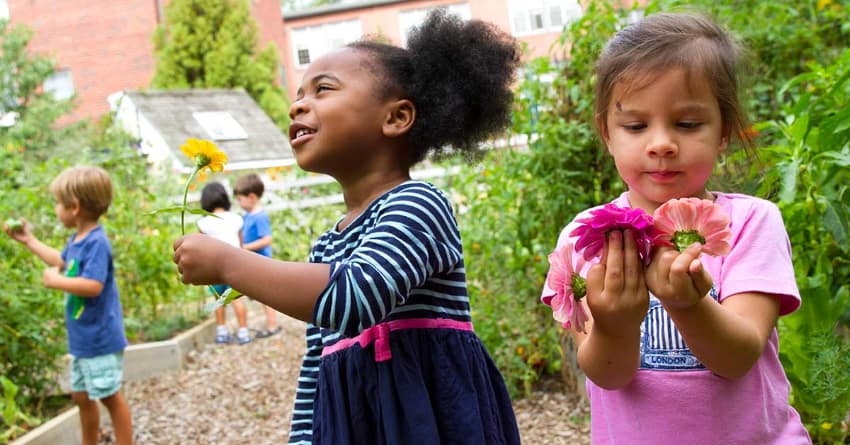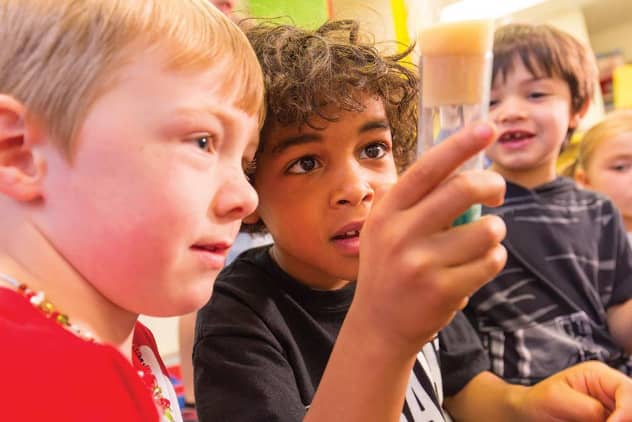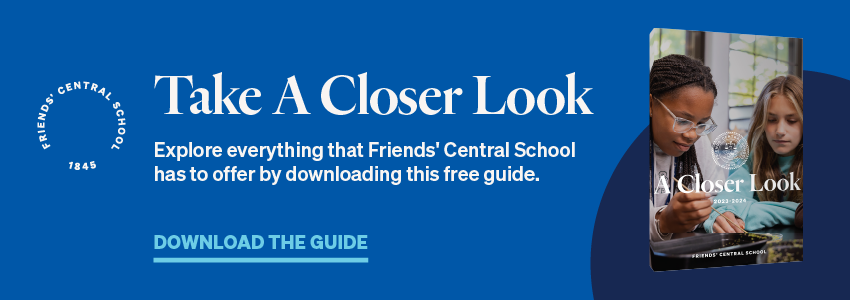
Wouldn’t it be great if all children felt valued and accepted, and learned to value and accept others despite their differences? If they learned to listen to one’s own voice and listen to the voices of others? If they were taught to identify, accept, and regulate one’s own impulses and emotions, and to exercise self-control?
What if they were mindful of the impact of one’s behavior on others, learned empathy, understood and practiced love, and were taught to make a choice to do good?
This is the experience that Friends’ Central aims to create for the children in our Nursery.
Friends’ Central School teachers enjoy the privilege and responsibility of working in an educational environment where we are encouraged to practice kindness and respect while we invite exploration, courage, justice, self-advocacy, and taking a stand for others. We believe that behavior matters. We are charged with our School’s vision, “to awaken courage and intellect—and peacefully transform the world.”
Creating an “Everybody Place” in Nursery
This most important work begins earnestly with all early-childhood educators. Our work involves handling raw emotions and managing social interactions. Teachers model “expected” behavior and emotions; we explicitly label emotions and resolve conflicts in a fair, peaceful, and hopefully satisfying, manner.
Ready to take the next step? Come visit Friends' Central to see what we're all about!
Teaching fairness to children, especially, is of great importance, and so we aim to make sure that everyone is included and all students get a turn. We create an environment that encourages teachers and students to always be “our best selves.” We learn to forgive ourselves and others when we fall short.
Social and emotional learning in the classroom set a natural stage for our discussion of Social Justice later on in the year. Developing emotional and social intelligence, concepts discussed by Daniel Goleman in his books Emotional Intelligence (1995) and Social Intelligence (2006), provide the foundation for understanding the need for the pursuit of social justice.
For Friends' Central, Social justice is a natural extension of the Quaker testimony of Equality.Though definitions vary some, Merriam-Webster defines social justice to be a belief in the equality of all people and the act of working against existing social, political and economic inequalities.
Among the list of social skills that we introduce to our children and those that relate to social justice are:
- Turn-taking
- Celebration of others
- Helping others
- Sharing materials
- Making an apology, participating
- Being kind
- Accepting differences
- Resolving conflicts
- Listening actively
- Disagreeing respectfully
- Resisting peer pressure
- Compromise
- Cooperating and working with others
- Thinking before speaking
- Negotiating
- Learning to forgive
- Using good manners
- Becoming a flexible thinker
- Recognizing feelings in self and others
- Perspective taking
- Understanding the impact of one’s behavior on another
Laying the Groundwork for Social Justice
Strategies for laying the groundwork for exploring Social Justice include creating and holding up the value of fairness in our classroom.
We acknowledge and celebrate our similarities and differences by observing them in our diverse student population and by sharing children’s literature that supports that aim, including: We Are All Alike... We Are All Different (Cheltenham Elementary Kindergarteners), The Colors of Us (Karen Katz), and The Skin You Live In (Michael Tyler) during fall thematic units and Rules, About Me, Our Emotions, and Our Families, which support our Social Justice unit later in the year.

Children’s literature reflects all kinds of children—different colors, genders, from all over the world. Sharing kid-friendly fiction, nonfiction, and real-life stories about fairness and unfairness, as well as focusing on some of the moral giants of our time are riveting and a great introduction to a discussion of courage and the power and impact that people can have to make a positive difference in the world. Three-year-olds can detect the presence of fairness and unfairness.
We also stimulate thought by asking lots of questions during our daily “Question of the Day” and during class discussions including: Are all rules fair? What can you do if you find that rules are not fair? How are we the same and different? Do we all like the same things? Can you be friends with someone who looks different than you?
Throughout the curriculum, children are engaged in direct, hands-on experiences, including examining art which compels observation, analysis, and question generation. For example, “How can the lion and the lamb sit together?” (The Peaceable Kingdom, Edward Hicks) or “Why is the little girl going to school escorted by police officers?” (The Problem We All Live With, Norman Rockwell) or “Why does everyone look so different?” (The Golden Rule, Norman Rockwell).
Children of this age naturally enjoy dramatic play, so we act out powerful stories, such as the courageous Rosa Parks bus scene and the Montgomery bus boycott. We prepare for and participate in our own marches of protest and affirmation. Stories, class discussion, paintings, dramatic play, individual picture journal entries reflecting a child’s thoughts and understanding are some of the ways we explore social justice.
Treating Each Other, and Ourselves, Well
Human experience boils down to how each one of us is treated and how we treat each other every day. Essentially, enlightened social intelligence and social justice means treating people right. By treating people right, our hands can positively touch the future—one microbatch of teachers and children at a time.



